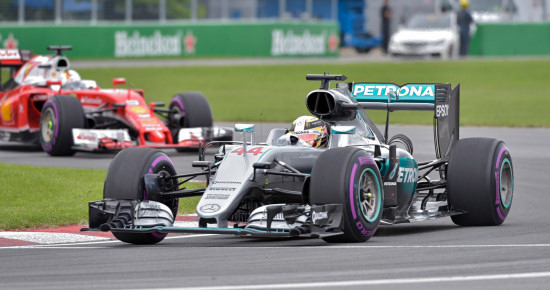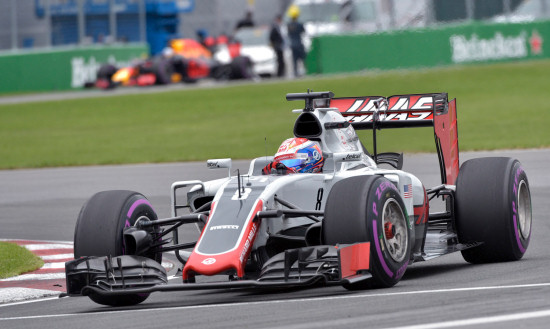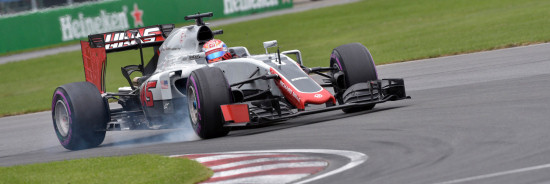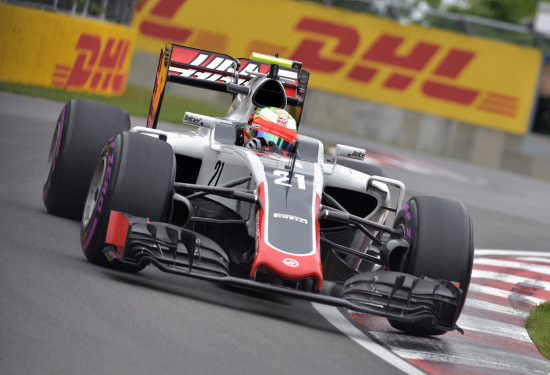The Way It Is/ Building a competitive American Formula 1 teamby Gordon Kirby |
 This year has witnessed the debut of Gene Haas's Team Haas Formula 1 team. Driven by Frenchman Roman Grosjean and Mexican Estaben Gutierrez, Haas's Ferrari-powered Dallaras have run better than expected on occasion with Grosjean scoring points in three races. Grosjean's best result to date was fourth place in April's Russian GP and the Frenchman has accumulated 22 points for Haas in F1's Constructors' Championship.
This year has witnessed the debut of Gene Haas's Team Haas Formula 1 team. Driven by Frenchman Roman Grosjean and Mexican Estaben Gutierrez, Haas's Ferrari-powered Dallaras have run better than expected on occasion with Grosjean scoring points in three races. Grosjean's best result to date was fourth place in April's Russian GP and the Frenchman has accumulated 22 points for Haas in F1's Constructors' Championship.
At last weekend's Canadian GP, Gutierrez and Grosjean qualified and finished thirteenth and fourteenth. In Montreal, I discussed Team Haas's progress with team principal Guenther Steiner. We started by talking about Gene Haas's way of doing business. "I would say Gene's strength is that if he doesn't understand a business he won't do it," Steiner said. "He's very clever in that sense. In the machine tool business he knows what the customer wants. He knows what he wants his people to make and he knows what will sell. He has a strong understanding of that industry and it's the same in motor sport. "When we started talking about doing a Formula 1 team in 2010, he didn't jump on it and say, 'Let's start in 2011.' He took the time to understand Formula 1 and build a good knowledge base. Obviously, he will make some mistakes because experience comes through making mistakes. He took the time to take a close look and build an understanding for Formula 1. When he was sure it could be done he said, 'Guenther, let's get a license for this. I think we're ready now.'  © Gary Gold "People were very skeptical in the beginning and rightly so, I would say, because the last four American teams were not success stories. So why should this one work? But Gene pulled it off, the team pulled it off and here we are. "Another reason why Gene Haas is successful is he doesn't get confused or distracted. We're not trying to do it all. We have a plan and we're sticking to that plan. I fully agree with that approach. We're not trying to please everybody and have no success. We are trying to achieve success each step of the way." Haas started his company called Haas Automation in 1983 to manufacture machine tools in Sun Valley, California. Five years later Haas introduced a new machine tool called the VF-1 and began to build a global business. Haas moved his operation to Oxnard in 1997 and opened a European manufacturing facility in Belgium in 2000. Today, Haas Automation is America's largest CNC machine tool manufacturer. With his F1 team as a marketing platform, Haas aims to build and expand his global market. "I think some people may not appreciate the work and success Gene has achieved in the machine tool business because they don't know about it," Steiner remarked. "People in the machine tool business know how difficult it is to build those machines in the United States to compete against the Asians and the Germans. Gene has been able to establish a big market share and everyone in the machine tool business knows what the Haas brand means. "To make a viable machine tool business in the United States is not easy. Labor costs in this country and in California in particular are high so it says a lot about Gene's business skills that he can manufacture his products in this country." Ferrari is among Haas's many customers around the world. Haas and Steiner used Haas's leverage with Ferrari to work out an agreement for Ferrari to supply Team Haas with engines and transmissions mated to Haas chassis built by Dallara. Haas also owns and operates the Windshear wind tunnel in North Carolina which is a key component in the team's development. "The plan is always to go forward," Steiner said. "Our plan was to get here and stabilize the team. We are in the wind tunnel every second week, as we are allowed to. We are now working hard on the 2017 car. The engine package is being developed by Ferrari. They are relentless in their development. Everybody in the team is doing their job and we've had a little bit of success which has given everyone a good feeling. We will continue to develop the car and keep building on our team of people. Maybe next we will add a few more people and we will just keep building and developing."  © Gary Gold "We will stay in Kannapolis," Steiner said. "The United States is our headquarters. All the senior management is there. It's a lot of work but this is how we set the company up. We've worked hard to pull it all together. We want to be an American team. We are an American team. We have bases in the UK and in Italy, but our home, the team's home, is in the United States. "Certainly for the short term we will continue to operate this way because it seems to be working. So why disrupt it now? Let's try to get some results and we'll see where that takes us. Maybe in the longterm we will make some changes but for the mid-term we will stay here in the United States." Team Haas also benefits from being able to draw from the vast engineering and manufacturing resources of Stewart/Haas's NASCAR team, co-owned by Haas and Tony Stewart. "We've brought a few people over from the NASCAR team," Steiner said. "Matt Borland is working for the F1 team for example. A good engineer is a good engineer. You just need to give him the experience and the exposure to a certain area of engineering or a category. For sure, to come into Formula 1 from nothing is very difficult. "An aerodynamicist from Formula 1 can come into NASCAR and find it difficult because he lacks experience. In the same way you probably wouldn't take a crew chief from a NASCAR team and make him a Formula 1 engineer. They would need exposure and experience. They would have to start from the bottom and work their way up. "The biggest thing we can take from the NASCAR team is the experience it took Gene to set up the team and how to make it a success. Gene is more experienced than any of us in doing that kind of thing and we can all learn from him." Steiner says Team Haas will be very selective in forging agreements with commercial sponsors. "Sponsorship is always important but it's also important to have the right partners," he emphasized. "In any business a lot of people are interested when you are new or not yet on the market. But in the end it costs you money to have them as a sponsor because they think they can be on your car for a cheap way into F1 because you're new.  © Gary Gold Steiner also discussed Team Haas's hopes to have an American driver in the future. "It would be our dream to have an American driver being World Champion in our car," he remarked. "That is what we work for. But at the moment, having an American driver in the team would not help anybody. When we started we didn't know how good the car was or how good the drivers were. Having an American driver in a non-successful American team would be a disaster for America. The risk would be too high for the individual and for the team. "We said we need to have drivers who are known quantities. We are supporting Santino Ferrucci in the lower formula. We believe he's one of the best young drivers out there and in two or three years he may be ready for Formula 1. We won't know how good he or any of these young drivers are until they sit in a Formula 1 car." Ferrucci, 17, was born and raised in Connecticut. Ferrucci has raced Formula 3 cars the last two years and is competing in this year's GP3 series. Steiner also offered his assessment of Josef Newgarden and Alex Rossi. "I think Newgarden and Rossi are good drivers, but they are in that age range where it wouldn't be right to throw them into Formula 1," he commented. "Alexander was here for a few years and he did a good job. Now he's won the Indy 500 and for a driver that must be a fantastic success. Rossi and Newgarden are now trying to make their mark in IndyCar. They are both on the way to achieving that and making a good living out of racing in IndyCar. "If Newgarden came to Formula 1 the risk is very high for him to fail. If he struck out here, he would have nowhere to go. He's doing very well in IndyCar and with a little bit of luck in my opinion he will be the next successful American IndyCar driver. "I have talked with him. He introduced himself and I think he has a very nice personality but for us to make a test for him is impossible. We could only test him in a two-year old car, so it's very difficult. "Our focus is on continuing to do what we're doing, which is to stabilize and develop the team. When we have done that we can be a good platform for an American driver."  © Gary Gold "I think most of the challenge is how the media is going to work," he said. "How are we going to show F1 to the world? What is the next step in the TV presentation? I think that is the next challenge for Formula 1. What does Formula 1 have to do to get people interested? Fewer people are watching TV these days. It's a different world. Young people today live in a different world. "I believe there are still car people among today's young people. I disagree with the theory that says they don't care about cars. They like cars but they see it from a different medium. I think people are still interested in motor sport. Look at the Indy 500 with 400,000 people. We need to make events like the Indy 500 where people come for the event, not just the race. People go to the Coachella concert in California not just for the music, but for the fun. "So those are some of the challenges. But that is just my opinion. I am not an expert in things like commercial rights or selling those rights. But I think there are still people who are interested in race cars. I don't think that will go away for a long time. I think young people are interested in cars. They just don't want to sit at home watching the race on TV with their 50 year old father. We need to provide them with more opportunities to look at Formula 1." Finally, I asked Steiner what the biggest challenge is for him as Haas's team principal. "It's the complexity of everything, the politics, the technical side and the racing," he said. "I am privileged to be allowed to do this. I enjoy it. It's complicated and difficult, but it's very motivating. It's what gets you up every morning." |
|
Auto Racing ~ Gordon Kirby
Copyright ~ All Rights Reserved |
